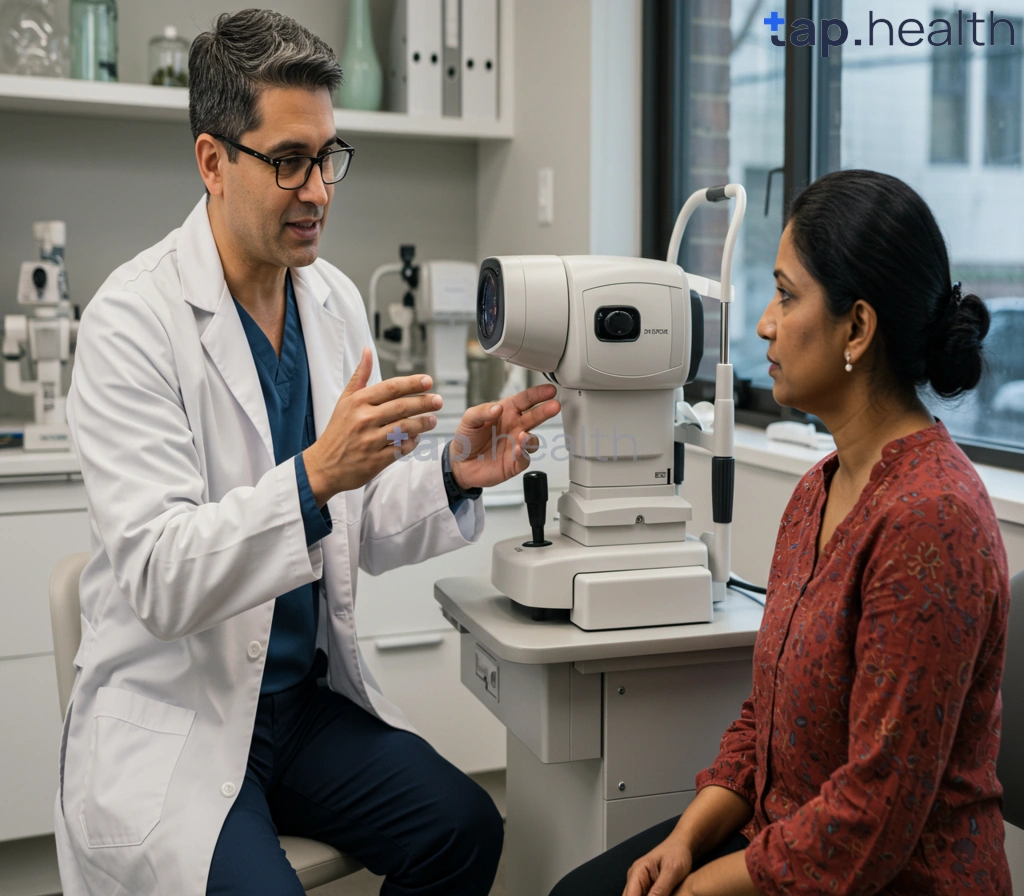Table of Contents
- Glaucoma, Macular Degeneration & Diabetes: What You Need To Know
- Protecting Your Vision: An Ophthalmologist’s Guide to Glaucoma, AMD & Diabetes
- Diabetic Retinopathy, Glaucoma, and Macular Degeneration: Early Detection is Key
- Understanding Age-Related Macular Degeneration, Glaucoma, and Diabetes
- Glaucoma, Macular Degeneration, and Diabetes: Latest Treatment Advances
- Frequently Asked Questions
- References
Are you concerned about your eye health, especially as you age? Many of us worry about common vision problems, and understanding the risks is crucial. This blog post, Glaucoma, Macular Degeneration & Diabetes: An Ophthalmologist’s Update, offers essential information on three significant eye conditions. We’ll explore the latest advancements in diagnosis and treatment, helping you make informed decisions about your vision care. Learn how these conditions affect your sight and what steps you can take to protect your most precious sense. Let’s dive in!
Glaucoma, Macular Degeneration & Diabetes: What You Need To Know
Diabetes significantly increases the risk of developing serious eye diseases like glaucoma and macular degeneration. This is particularly concerning in India and other tropical countries, where diabetes prevalence is high. Consider this: 61% of people with diabetes are aged between 20-64 years, a crucial working age group, impacting productivity and economic well-being. This statistic highlights the urgent need for awareness and proactive eye care.
Understanding the Links
Diabetes damages blood vessels, impacting the eyes’ delicate structures. In glaucoma, this leads to increased intraocular pressure, damaging the optic nerve and causing vision loss. Macular degeneration, on the other hand, affects the central part of the retina, responsible for sharp, central vision, leading to blurry vision and potential blindness. These conditions often have no early symptoms, making regular eye exams crucial.
Protecting Your Vision
Regular eye check-ups are paramount, especially if you have diabetes or a family history of these conditions. Early detection is key to managing these diseases and preserving vision. In India and many tropical regions, access to quality ophthalmological care can be a challenge, highlighting the importance of seeking care from qualified professionals. For those aged 65+, who represent a significant portion of the diabetic population (39%), regular monitoring is even more critical. For more advice on protecting your vision with diabetes, see our article on How to Protect Your Vision with Diabetes: Essential Eye Care Tips.
Actionable Steps for Better Eye Health
Maintain healthy blood sugar levels through diet and exercise. Protect your eyes from sun damage with sunglasses and hats. Schedule a comprehensive eye examination with an ophthalmologist immediately. Don’t delay—your vision is precious. Early detection and treatment can significantly improve your quality of life and prevent irreversible vision loss. The challenges of managing diabetes, especially as you age, are significant. For further insights, read our article on Managing Diabetes as You Age: Challenges and Solutions.
Protecting Your Vision: An Ophthalmologist’s Guide to Glaucoma, AMD & Diabetes
Diabetes significantly impacts eye health, increasing the risk of developing serious conditions like glaucoma and age-related macular degeneration (AMD). In fact, studies show a 70% increased risk of sleep apnea, a sleep disorder often linked to uncontrolled diabetes, adding another layer of concern. This heightened risk underscores the importance of regular eye exams, particularly in high-risk populations common in Indian and tropical countries. Managing diabetes effectively is crucial, and you can learn more about protecting your heart with Protect Your Heart from Diabetes: 5 Essential Steps.
Understanding the Links
Glaucoma, a condition damaging the optic nerve, often shows no early symptoms. Similarly, AMD, a leading cause of vision loss, can progress silently. Diabetes accelerates the damage in both conditions. High blood sugar levels damage blood vessels in the retina and optic nerve, increasing pressure and potentially leading to irreversible vision loss. Early detection and management are crucial. This is especially important in regions with limited access to healthcare, where proactive steps can make a significant difference.
Protecting Your Eyes
Regular comprehensive eye exams are vital, especially if you have diabetes or a family history of glaucoma or AMD. Maintaining healthy blood sugar levels through diet, exercise, and medication (if necessary) is paramount. In tropical climates, protecting your eyes from excessive sun exposure is also crucial, as UV radiation can exacerbate eye conditions. Supporting your eye health through proper nutrition is also important, and you might find Eating for Healthy Vision: Nutrients for Eye Health – Tap Health helpful. Regular eye checkups should be a part of your overall health plan.
Seeking Help in India and Tropical Countries
Access to quality ophthalmological care can vary across India and tropical countries. Identifying reputable ophthalmologists and eye care facilities in your area is essential. Don’t hesitate to seek second opinions and explore options for affordable and accessible eye care. Protecting your vision is an investment in your overall well-being. Early intervention significantly improves the chances of preserving your sight.
Diabetic Retinopathy, Glaucoma, and Macular Degeneration: Early Detection is Key
Early detection is crucial in managing diabetic retinopathy, glaucoma, and macular degeneration, three leading causes of vision loss prevalent in India and other tropical countries. These conditions often share risk factors, emphasizing the importance of comprehensive eye exams, especially for those with diabetes. Diabetic retinopathy, a complication of diabetes, damages blood vessels in the retina, leading to blurred vision, floaters, and even blindness. It affects a significant portion of the diabetic population; studies show that diabetic neuropathy, affecting 30-50% of patients, can further complicate diagnosis and management due to reduced mobility and potential difficulties attending appointments. Knowing How Often is Diabetic Eye Screening? is crucial for early intervention.
Understanding the Risks
Glaucoma, characterized by increased pressure within the eye, damages the optic nerve, causing gradual vision loss. Macular degeneration, affecting the central part of the retina, leads to blurred vision and difficulty with tasks requiring fine detail. While genetics play a role, lifestyle factors and environmental conditions prevalent in tropical climates can exacerbate these conditions. Sun exposure, for example, is a significant risk factor for macular degeneration.
Prioritizing Eye Health
Regular comprehensive eye examinations are vital for early detection and timely intervention. Early diagnosis significantly improves treatment outcomes and the chances of preventing irreversible vision loss. For individuals with diabetes, annual eye exams are strongly recommended, along with diligent management of blood sugar levels to minimize the risk of diabetic retinopathy. In India and other tropical regions, access to quality ophthalmological care remains a challenge for many, highlighting the need for increased awareness and improved healthcare infrastructure. Seek advice from your ophthalmologist to create a personalized eye care plan suited to your needs and risk factors. Remember that managing overall health, including aspects like Why Oral Health Matters for Diabetic Patients, plays a significant role in preventing complications.
Understanding Age-Related Macular Degeneration, Glaucoma, and Diabetes
Age-related macular degeneration (AMD), glaucoma, and diabetes are significant eye health concerns, particularly prevalent in India and other tropical countries. These conditions often share risk factors, and their impact is amplified by lifestyle choices. For example, smokers with diabetes face a doubled mortality risk due to cardiovascular issues, highlighting the interconnectedness of overall health and vision. This underscores the importance of proactive eye care in these regions.
Macular Degeneration
AMD affects central vision, making everyday tasks like reading difficult. Early detection is crucial for managing its progression. Regular comprehensive eye exams, especially for those with a family history of AMD, are essential. In India, access to quality eye care varies regionally, so seeking out reputable ophthalmologists is paramount.
Glaucoma
Glaucoma, a leading cause of irreversible blindness, damages the optic nerve. Elevated intraocular pressure is a major risk factor, but not the only one. Regular pressure checks are vital, along with a thorough eye examination to detect early signs. Awareness and early intervention are crucial in preventing vision loss from glaucoma, especially in populations with limited access to healthcare.
Diabetes and Eye Health
Diabetes significantly increases the risk of developing diabetic retinopathy, a leading cause of blindness. High blood sugar damages the blood vessels in the retina, leading to vision impairment. Strict blood sugar control, regular eye exams, and healthy lifestyle choices are vital for preventing or managing diabetic retinopathy. The increased cardiovascular risk associated with diabetes and smoking further emphasizes the need for comprehensive healthcare management. Understanding the link between diabetes and other health issues, such as obesity, is also crucial. For more information, see our blog on Understanding the Link Between Diabetes and Obesity.
In India and other tropical countries, access to quality eye care remains a challenge for many. Therefore, proactively scheduling regular comprehensive eye examinations with a qualified ophthalmologist is crucial for early detection and management of these conditions, thus preserving sight and overall well-being. The importance of proactive health management extends beyond eye health; managing conditions like Age-Related Fatigue can also play a role in overall well-being.
Glaucoma, Macular Degeneration, and Diabetes: Latest Treatment Advances
The global rise in diabetes, from 200 million in 1990 to a staggering 830 million in 2022 (WHO Report), highlights a critical concern for ophthalmologists in India and other tropical countries. This dramatic increase significantly impacts the prevalence of diabetic retinopathy, a leading cause of blindness, alongside glaucoma and macular degeneration. These three eye diseases often share risk factors and require specialized care.
Advances in Glaucoma Treatment
Recent advances in glaucoma management include improved surgical techniques like minimally invasive glaucoma surgery (MIGS), offering less invasive options compared to traditional procedures. Furthermore, new glaucoma medications are being developed, focusing on reducing intraocular pressure (IOP) with fewer side effects. Regular eye exams are crucial, particularly for those with a family history of glaucoma or diabetes.
Macular Degeneration Therapies
The treatment landscape for macular degeneration, a leading cause of vision loss in older adults, has also seen significant progress. Anti-VEGF injections, a mainstay of treatment, continue to improve, with newer formulations offering longer-lasting effects and reduced injection frequency. For patients in India and tropical regions, access to these treatments and regular monitoring remains a critical challenge.
Diabetic Retinopathy Management
Effective diabetic retinopathy management involves strict blood sugar control to slow disease progression. Regular dilated eye examinations are essential for early detection. Laser therapy and anti-VEGF injections remain key treatment modalities, with a growing emphasis on teleophthalmology to improve access to care in remote areas of India and other tropical countries. Early detection and consistent management are paramount to prevent vision loss. Managing diabetes effectively is key, and learning about How Can New Technological Advances Improve Diabetes Lifestyle? can be beneficial.
Actionable Steps for Better Eye Health
For individuals in India and tropical countries, prioritizing regular comprehensive eye exams is crucial. Early diagnosis and timely intervention can significantly improve outcomes for glaucoma, macular degeneration, and diabetic retinopathy, reducing the burden of preventable blindness. Consult your ophthalmologist for personalized advice and treatment plans. Remember that alongside medication and lifestyle changes, exploring Safe and Effective Dietary Supplements for Diabetes Care can be a helpful addition to your overall health plan, especially if you have diabetes.
Frequently Asked Questions on Glaucoma, Macular Degeneration & Diabetes
Q1. How does diabetes increase my risk of eye diseases like glaucoma and macular degeneration?
High blood sugar levels damage blood vessels in the eyes. In glaucoma, this damages the optic nerve, and in macular degeneration, it harms the retina, both leading to vision loss.
Q2. What are the early symptoms of diabetic eye diseases, and why are regular eye exams important?
Diabetic eye diseases often have few or no early symptoms. Regular comprehensive eye exams are crucial for early detection, allowing for timely treatment and preventing irreversible blindness.
Q3. What preventative measures can I take to protect my eyesight if I have diabetes?
Maintaining healthy blood sugar levels through diet, exercise, and medication is vital. Protecting your eyes from sun damage by wearing sunglasses is also important.
Q4. What are the latest treatment options available for diabetic eye diseases?
Advances include minimally invasive glaucoma surgery and anti-VEGF injections for macular degeneration. However, consistent management and early intervention are key for best results.
Q5. What challenges exist in accessing quality eye care, and what can I do?
Access to quality ophthalmological care is a challenge in many areas. Proactive healthcare seeking and advocating for improved healthcare infrastructure are important steps.
References
- A Practical Guide to Integrated Type 2 Diabetes Care: https://www.hse.ie/eng/services/list/2/primarycare/east-coast-diabetes-service/management-of-type-2-diabetes/diabetes-and-pregnancy/icgp-guide-to-integrated-type-2.pdf
- Domain Adaptive Diabetic Retinopathy Grading with Model Absence and Flowing Data: https://arxiv.org/pdf/2412.01203



